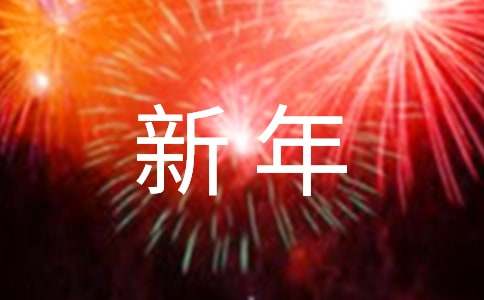- 相关推荐
新年的传说英语
新年,即一年的第一天,为世界多数国家通行的节日。世界各国,特别是古代,新年都有不同的日期,现代世界多数国家定为公元制纪年的1月1日。现代中国将“元旦”称为公历新年,将“春节”称为农历新年。下面为大家带来了新年的传说英语,欢迎大家参考!

新年的传说英语1
The Origin of Chinese New Year The Chinese New Year is now popularly known as the SpringFestival because it starts from the Begining of Spring (the first of the twenty-four terms incoodination with the changes of Nature)。 Its origin is too old to be traced. Severalexplanations are hanging around. All agree, however, that the word Nian, which in modernChinese solely means year, was originally the name of a monster beast that started to prey onpeople the night before the beginning of a new year.
One legend goes that the beast Nian had a very big mouth that would swallow a great manypeople with one bite. People were very scared. One day, an old man came to their rescue,offering to subdue Nian. To Nian he said, I hear say that you are very capable, but can youswallow the other beasts of prey on earth instead of people who are by no means of yourworthy opponents? So, it did swallow many of the beasts of prey on earth that alsoharrassed people and their domestic animals from time to time.
After that, the old man disappeared riding the beast Nian. He turned out to be an immortalgod. Now that Nian is gone and other beasts of prey are also scared into forests, peoplebegin to enjoy their peaceful life. Before the old man left, he had told people to put up redpaper decorations on their windows and doors at each years end to scare away Nian in case itsneaked back again, because red is the color the beast feared the most.
From then on, the tradition of observing the conquest of Nian is carried on from generation togeneration. The term Guo Nian, which may mean Survive the Nian becomes today Celebratethe (New) Year as the word guo in Chinese having both the meaning of pass-over andobserve. The custom of putting up red paper and firing fire-crackers to scare away Nian shouldit have a chance to run loose is still around. However, people today have long forgotten whythey are doing all this, except that they feel the color and the sound add to the excitement ofthe celebration.
新年的传说英语2
About the origin of "Spring Festival", have a kind of legend is: ancient China has a kind of call "years" the beast. "Year", head long feelers,
fierce abnormalities. "Year" in the seabed, each elder deep to specific day (New Years eve) is now just climbed out, swallowed cattle damage lives. Therefore, every day, New Years eve CunCunZhaiZhai people FuLaoXieYou fled to the mountains, to avoid "nian" damage. A NianChuXi, from the village outside a begging the old man. Village a hurried panic scene, nobody answered him, only village as an old woman gave the old man some food, and urged him quickly up the hill avoid "year", the old man beard pulls up say with smile: "mother-in-law if let me stay at home all night, and Ill get years away." The old woman continue to persuasion, begging the old man smiling without a word. At midnight, "year" rush into village.
It found the village atmosphere is different from the village as the familys home, wife: DaGongZhi room door post candle lit. "Nian" was a shake, call loudly. Nearly the door, hospital suddenly spread produced crackling sound, Fried "year" shuddered, again dare not go up. Originally, "nian" most afraid of red, the light of fire, and exploding. At this time, her mother-in-laws door open, see an old man in reds court in laughing. "Nian" was surprised and distressed. Escape flied The second day is the first month, seek refuge back people see the village safe, very surprised. At this time, the old woman is suddenly enlighted, quickly to the villagers told begging the old mans promise. It quickly spread around the village, people know driven "nian" way. Since then, every year New Years eve put up red couplets, firecrackers, Family candle lit, ShouGeng for years. Kicks in early morning, still walk a friend congratulate. This custom widely spreads, has become Chinas folk ceremonious traditional festival.
翻译:
关于“春节”的起源,有一种传说是:中国古时候有一种叫“年”的兽。“年”,头长触角,凶猛异常。“年”长年深居海底,每到特定的一天(就是现在的除夕)才爬上岸,吞食牲畜伤害人命。因此,每到除夕这天,村村寨寨的人们扶老携幼逃往深山,以躲避“年”的伤害。有一年除夕,从村外来了个乞讨的老人。乡里一片匆忙恐慌景象,没有人理会他,只有村东头一位老婆婆给了老人些食物,并劝他快上山躲避“年”,那老人把胡子撩起来笑道:“婆婆若让我在家呆一夜,我一定把‘年’赶走。”老婆婆继续劝说,乞讨老人笑而不语。
半夜时分,“年”闯进村。它发现村里气氛与往年不同:村东头老婆婆家,门贴大红纸,屋内烛火通明。“年”浑身一抖,怪叫了一声。将近门口时,院内突然传来“噼里啪啦”的炸响声,“年”浑身战栗,再不敢往前凑了。原来,“年”最怕红色、火光和炸响。这时,婆婆的家门打开,只见院内一位身披红袍的`老人在哈哈大笑。“年”大惊失色,狼狈逃蹿了。
第二天是正月初一,避难回来的人们见村里安然无恙,十分惊奇。这时,老婆婆才恍然大悟,赶忙向乡亲们述说了乞讨老人的许诺。这件事很快在周围村里传开了,人们都知道了驱赶“年”的办法。从此每年除夕,家家贴红对联、燃放爆竹;户户烛火通明、守更待岁。初一一大早,还要走亲串友道喜问好。这风俗广泛流传,成了中国民间最隆重的传统节日。